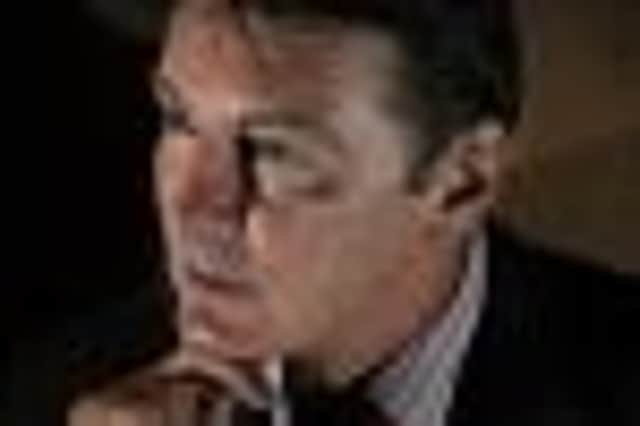Gordon Smith: I’d have stayed at Rangers for free


The man himself has since comprehensively rubbished the suggestion that he was ever a candidate, although another question could be this: why should he not feel qualified to occupy a senior position with a high-profile club such as Liverpool, having endured the stresses and strains of being chief executive of the Scottish Football Association and then observed at close quarters how not to run a business during a seven-month stint at Rangers, under Craig Whyte?
Smith was one of the first victims of the Ibrox club’s plunge into administration. He has since stressed that he had no knowledge of the extent to which Rangers’ finances were unravelling. He complained of being isolated by Whyte and “undermined” when it came to the subject of transfer targets, which was meant to be a major part of his portfolio. He is one of the few people to have recently spent time in Govan not included in the club’s list of creditors.
Advertisement
Hide AdAdvertisement
Hide Ad“I could have gone in as a creditor because my contract was not paid up,” he explains. “But I didn’t bother. I just wanted to walk away. I love the club.


“A lot of people are saying what was your role there anyway?” he continues. “My role was a medium-to-long-term role of putting strategies in place. I drew up papers on developing strategies for the recruitment of players, both to purchase and on Bosmans. There was also a strategy to build up the youth side and a strategy for scouting. I would say this: I thought Craig Whyte had a long- term view about what he was going to do. Looking back, I realise he did not. I asked him outright: ‘are you going to sell this club on or are you here for long term?’ He said: ‘no, no I will have this club for a few years’. That’s what he told me.”
Whyte hasn’t proved as temporary as some of the trialists who flitted in and out of Murray Park. This was another of Smith’s departments, although the players selected always had manager Ally McCoist’s full approval. “One of the strategies we had to look at, because of the financial situation, was bringing in trialists,” he says. “A lot of people suggested that they were brought in against Ally’s will. That was not true. We always discussed it. Eight in total came in, and at the end of the day some were not better than what we had there. The only one we did sign in the end was [Sone] Aluko, who wasn’t a bad signing.” One of those let go again was Jorge Claros, and his performances with Hibernian at the end of last season do not suggest a grave error of judgment. “You have to perform,” Smith says. “He did OK. The second part of it is asking: is he better than what we have? Every trialist was a full international or, at worst, an Under-21 player. Would he be challenging for a place? No. That’s what ruled him [Claros] out.”
Smith himself lasted little more than seven months in the job before he and chief operating officer Ali Russell were removed in the first of few staff cuts made by the club’s administrators Duff & Phelps. He has now revealed that he offered to remain in an “advisory” capacity. “I offered to stay on. I was more or less saying you can have me for nothing,” he says. “But they said: ‘no, you are not required any longer’.”
Smith might have proved useful as Rangers’ predicament developed into a battle with the SFA. His knowledge of the inner workings at Hampden would have been valuable as Rangers risked Fifa’s ire by taking the matter of their appeal over a 12-month signing embargo to the Court of Session. “That was a classic situation where I could have been of help,” Smith says. “When I saw they had appealed, the worry for me, knowing what I do, is that the sanction could be more severe. It could be expulsion from SFA membership.”
These are now the worries of others. Smith might have made a swift return to Ibrox had Club 9 Sports gained control. Prior to the Tennessee tycoon Bill Miller’s involvement and had the consortium won preferred bidder status, Smith was earmarked for a role. “They were saying it was a possibility if they got control they wanted to give me a position,” he says. “I did speak to them. Bill Miller came in afterwards. I would have been open to coming back.”
Intriguingly, Smith might now have been at loggerheads with Rangers, but his time with the SFA ended in April 2010. “The SFA have more money now than ever before after agreeing the best-ever TV deal, I was very much part of that,” he says. “The only problem I found was the fact we had to ban the players [Allan McGregor and Barry Ferguson] – and it was a board decision – from international duty, that was the one downside of my time.”
Coincidentally, both players were employees of Rangers at the time. The Ibrox side, he says, are “my club”, and so too are Brighton & Hove Albion, where he earned an FA Cup runners-up medal in 1983. Smith was recently linked with a return to the club as chief executive, although the post was filled earlier this week by the appointment of former English FA commercial director Paul Barber.
Advertisement
Hide AdAdvertisement
Hide Ad“I didn’t apply.” says Smith. “I was asked about it and I said I would be interested, but I did not hear anything more.” Where would he like to be in six months’ time? “I would like to be back in the game,” he says. “If anything comes up as chief executive or director of football I would be comfortable with that. In the coming weeks and months, I’d like to be back in football.”